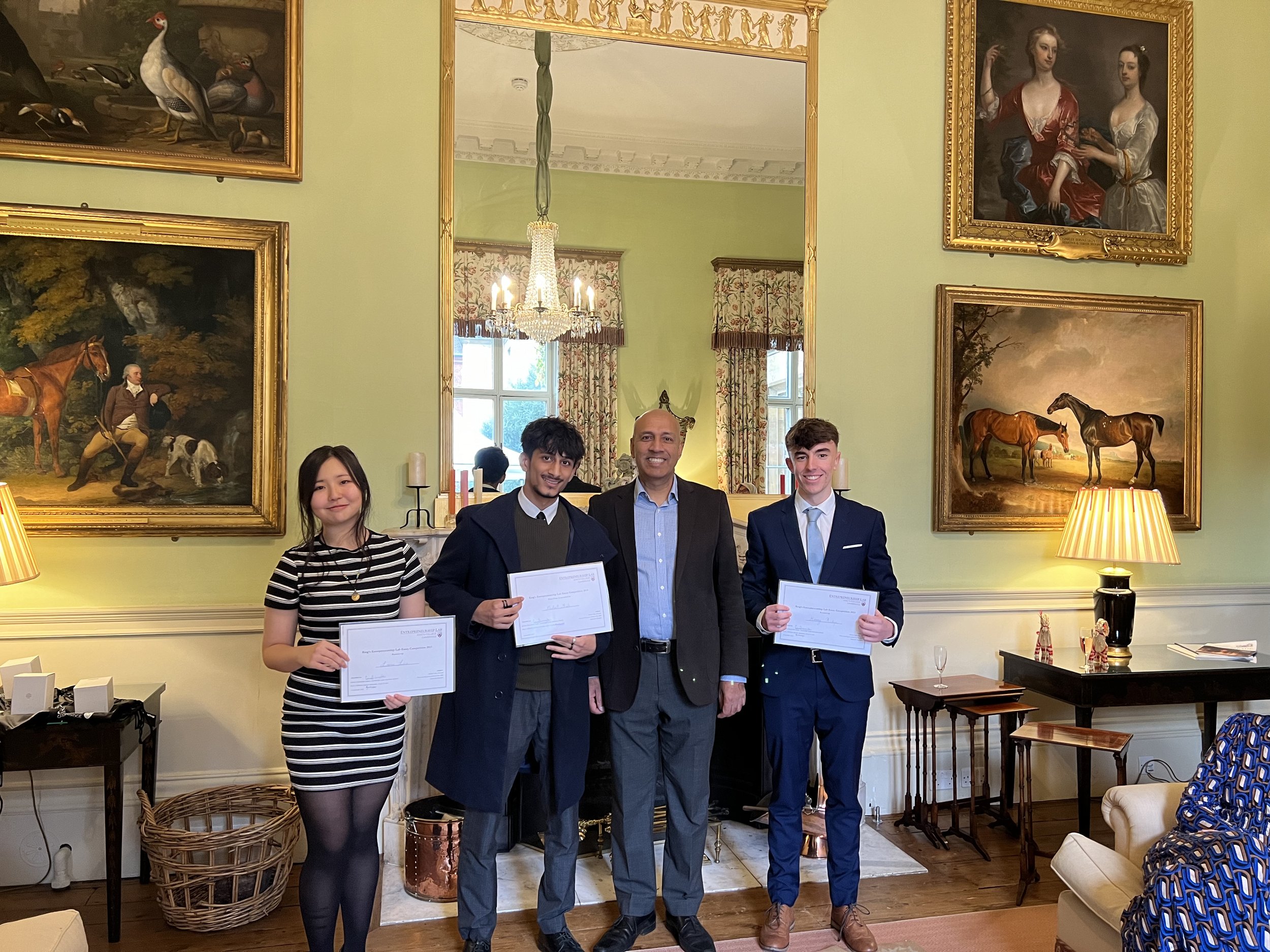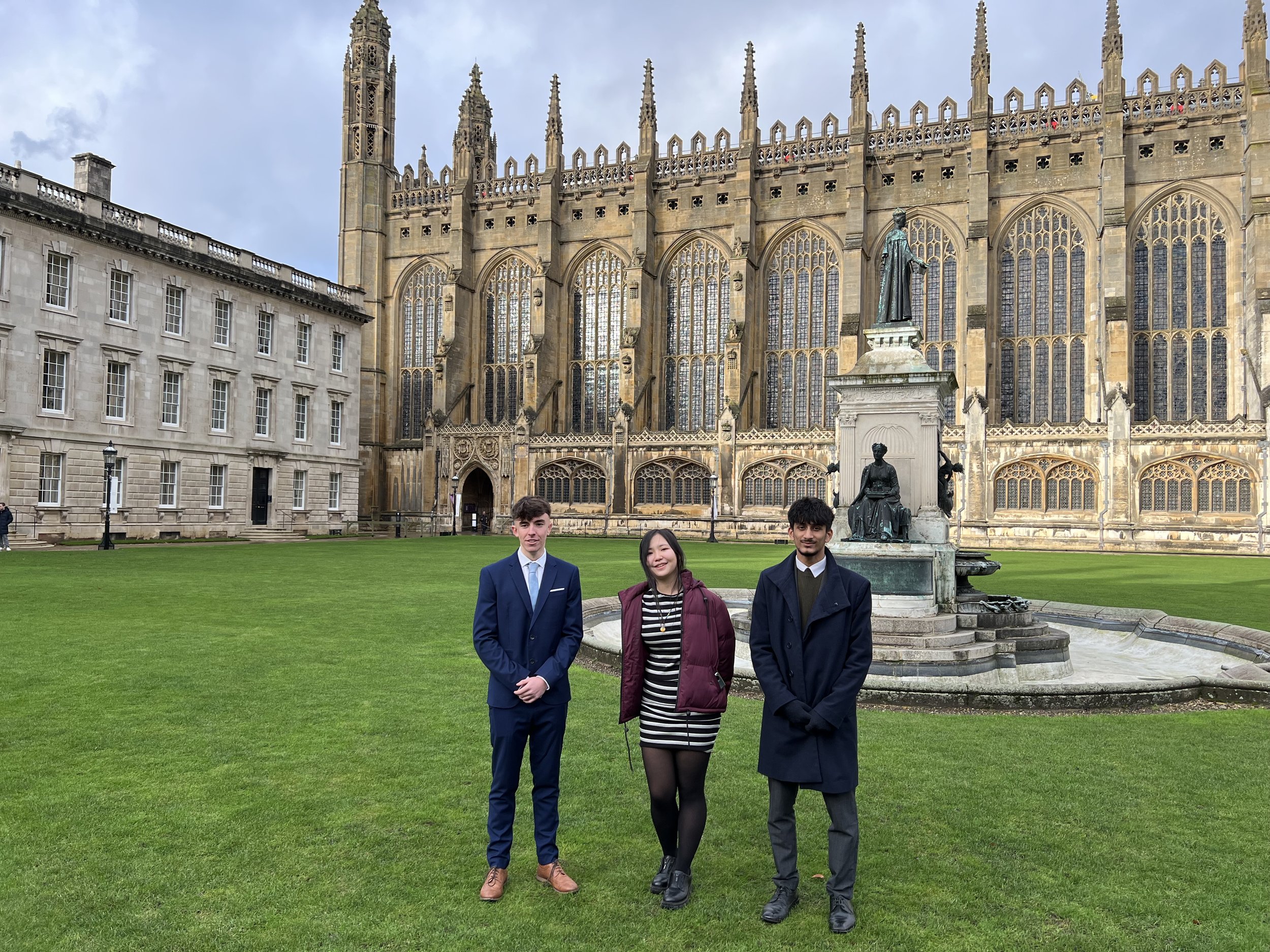King’s Entrepreneurship Lab Essay Competition 2023
Click here to view this years competition
We are delighted to announce that the winner of 2023 inaugural competition was Khaleel Miah with runners-up Leona Liu and Harry Ridge. A huge congratulation to our winners and a big thank you to everybody who submitted an essay in the inaugural competition. We had a fantastic selection of essays and it was a real challenge to pick just 3 winners from this pool!
Entries for the 2023 Competition are closed.
We are delighted to introduce our inaugural Entrepreneurship Essay Competition. The purpose of the competition is to encourage UK Sixth Form students to pursue entrepreneurial aspirations and understand better how to launch an enterprise. We are particularly keen to foster this entrepreneurial spirit among students who might not traditionally consider entering the world of business and further hope this competition encourages more young people, who might not think about it, to apply to Oxbridge and Higher Education.
The competition is organised and run by the Entrepreneurship Lab (E-Lab) at King’s College, University of Cambridge. More details about the E-Lab can be found on our About page.
Students should choose between one of the three essays questions, below, exploring the importance of entrepreneurism and the challenges that business-people face. This essay should be written independently by the student but with input from a teacher or mentor. Students from all backgrounds and regardless of subjects studied are welcome to enter the competition.
A winner, and two runners up, will be selected by our expert panel of judges: Deborah Meaden (Business Leader and TV Dragon), Lord Mervyn King (former Governor of the Bank of England), and Gillian Tett (FT Columnist and Editor-at-Large of the Financial Times USA). The winners will be invited to a prize-giving ceremony, to be held in King’s College, Cambridge, on 9th December 2023. The winner will share a £1,000 cash prize, to be split equally between the candidate and their school, and two runners-up prizes of £500, again shared equally between the candidate and their school. The school portion of the prize will be issued in the form of book tokens.
Essay Questions and Format
Students are invited to select one of the three questions below, to write a 1,000 word essay:
Q1: Many businesses advertise themselves as ethical and sell environmentally friendly or ethically sourced goods. However, they often do this at a premium price. To some extent this is due to the higher price of their inputs but often they also enjoy a higher profit. To what extent is it ethical for a business to have excess profits from selling ethical goods?
Q2: Why is learning from failure sometimes more effective than learning from success? Build upon examples of entrepreneurs (in the broad sense of the term) who were able to learn from failure.
Q3: Generative AI technology, built upon Large Language Models, such as ChatGPT has allowed entrepreneurs to operate more efficiently. Discuss the impact of this technology for entrepreneurs and provide examples of how it is being used.
Any format of essay is permitted, this can range from a more academic article to a blog article to a journalistic business type article. If footnotes are used, they will count towards the word limit. External references should be sourced in a bibliography at the end of the article, which will not count towards the word limit. We know that not all students will be familiar with referencing, so you might find the following page from the University, which links to a Guide to Harvard Referencing, helpful. Any other standard system of referencing style is also acceptable.
Eligibility
Any student studying at a school or college in the United Kingdom who will be in academic year 12 or 13, or equivalent (S5 or S6 in Scotland; Year 13 or 14 in Northern Ireland) on the day of the deadline (26th September 2023) is eligible to enter the competition. There are no requirements on subjects studied.
The submitted essay must be the student’s own work but the student is allowed to seek input from a teacher or mentor. Use of generative AI is forbidden (e.g. ChatGPT, Bing AI and Google Bard). Plagariasm and AI-usage checks will be carried out and any violating essay will be disqualified. More details on the University’s plagiarism rules can be found here.
Competition entries will need to be approved by a teacher: students are required to obtain permission from a teacher (of any subject) to sponsor their application and provide an official (school) email address which they can be contacted upon to confirm the eligibility of the student (by 29th September). There are a maximum of 5 essay entries per school and students can only submit one essay each. If there are more than 5 students wishing to partake per school, the school should hold an internal competition to select the best essays.
Timeline
26th June 2023 - Competition Opens
9PM 26th September 2023 - Deadline for submission of essays (we are unable to consider essays submitted after the deadline)
9PM 29th September 2023 - Deadline for schools to confirm eligibility of students (we are unable to consider essays without confirmation of eligibility by this deadline)
End-November 2023 - Winners announced
December 2023 - Prize-giving Ceremony at King’s College, Cambridge
Submissions
The submission should not contain any personally identifiable information. Please enter personal details in the submission form (link below) and not in the essay.
Please ensure you have obtained permission from a teacher at your school to submit, in the submission form you will need to provide an official (school) email address that your teacher is reachable on. Once an essay has been submitted, it is not possible to edit or resubmit.
The competition is free to enter. Please submit the essay as either a word or pdf document.
Any queries on the Essay Competition should be directed to Rhys Williams, entrepreneur@kings.cam.ac.uk
To submit your essay, please fill in this form here. The data notice and terms and conditions can be found here.
About our Judges
Deborah Meaden is a business leader, investor, writer and well known for her appearances on the BBC’s Dragon’s Den.
Lord Mervyn King is an economist and former Governor of the Bank of England, as well as a Professor of Economics at the LSE.
Gillian Tett is an author and journalist and Chair of the Editorial Board at the Financial Times. From October 2023, she will take over as the Provost of King’s College, Cambridge.
A shortlist of essays will be compiled by the King’s E-Lab Team, comprising of Dr Kamiar Mohaddes, Dr Thomas Roulet, Katrina Purser, Michaela Kadlecová, Adam Motloch, and Rhys Williams. This shortlist will be judged by our external Judging Board to confirm the winning entries.
Your Data
Any personal data which may be submitted in an entry will be processed by King’s E-Lab, including members of King’s College and the 3 external judges, in accordance with any applicable data protection legislation, and the Privacy Notice available here. By submitting your essay and entering the competition you acknowledge that you have read and agree to these terms. For further information contact the College’s Data Protection Lead at foi@kings.cam.ac.uk or write to the Data Protection Lead, King’s College, Cambridge CB2 1ST.
Frequently Asked Questions
Can I answer more than one of the three questions for the Essay Competition?
No, only one submission per person is allowed and this should only answer one of the three questions provided.
Can I make any changes once I have submitted my essay using the above form?
Please note that once you have submitted your entry it is not possible to make any changes – please ensure you are happy with your work before pressing ‘submit’.
Will I receive feedback on my essay?
Unfortunately, due to the high volume of submissions, it is not possible to provide feedback on individual essays.
Why do I need to include contact information for a teacher at my school, and who should this be?
After you submit your essay, we get in touch with a contact at your school so that they can confirm you are eligible for the competition, and that the essay is your own work. This can be any teacher at your school who knows you, for example, one of your subject teachers, your form tutor, or your Head of Year.




